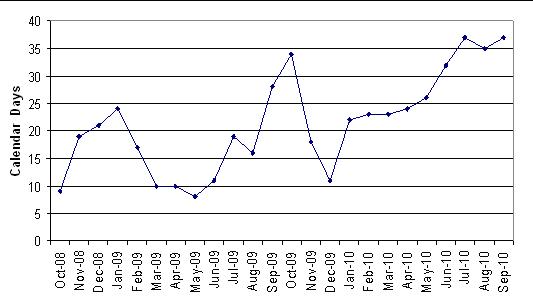Under the 2005 Base Realignment and Closure (BRAC) process, 10 Department of Defense (DOD) Central Adjudication Facilities (CAF) will move from their current locations to a newly constructed building at Fort Meade, Md. by September 15, 2011. To varying degrees BRAC will cause most of the CAFs to experience higher than normal personnel attrition rates this year. This could in turn increase the average amount of time it takes to adjudicate a security clearance. The 10 DOD CAFs are:
- ACCF – Army Central Clearance Facility
- DONCAF – Department of Navy Central Clearance Facility
- AFCAF – Air Force Central Adjudication Facility
- DOHA – Defense Industrial Security Clearance Office
- DOHA – Defense Office of Hearings and Appeals
- WHS CAF – Washington Headquarters Services Central Adjudication Facility
- NAS CAF – National Security Agency Central Adjudication Facility
- DIA CAF – Defense Intelligence Agency Central Adjudication Facility
- NGA CAF – National Geospatial-Intelligence Agency Collaborative Adjudication Facility
- JCS CAF – Joint Chiefs of Staff Central Adjudication Facility
| CAF | CURRENT LOCATION | PERSONNEL |
| ACCF | Fort Meade, MD | 162 |
| DONCAF | Washington Navy Yard, DC | 155 |
| AFCAF | Bolling AFB, DC | 142 |
| DISCO | Columbus, OH | 137 |
| DOHA1 | AZ, CA, MA, OH, & VA | 50 |
| WHS CAF | Arlington, VA | 42 |
| NSA CAF | Linthicum, MD | 39 |
| DIA CAF | Arlington, VA | 29 |
| NGA CAF | 5 | |
| JCS CAF | Arlington, VA | 1 |
|
Total:
|
762 |
Source: Destination Fort Meade, 2nd Edition, 2010
The new facility located near Fort Meade’s Mapes Road gate has 152,000 square feet of administrative office space that will provide workspace for 767 positions. ACCF personnel are least affected by this move. Their current office is located about 1 mile from the new building. NSA CAF personnel work in a building about 8 miles away and should also be relatively unaffected. Five CAFs are located within a 3-mile radius of the Pentagon. Their employees living in Virginia will have about 2 to 3 hours added to their round-trip commute time. AFCAF, DONCAF, and ACCF currently allow their personnel to telecommute about 50% of the time. Other CAFs may have similar policies, which should encourage some to stay on the job.
The big problem will be DISCO and DOHA personnel in Columbus, Ohio. These organizations handle clearance processing and adjudication for federal contractor personnel. In the past 2 years personnel attrition rates at DISCO have increased dramatically. In November 2010 Drew Winneberger, Director of Industrial Policy & Programs at the Defense Security Service (DSS) stated that the relocation has caused an 80% attrition rate among the adjudicators at DISCO. This has already had a significant affect on their operations. The number of pending cases at DISCO at the end of Fiscal Years 2008, 2009 and 2010 increased from 3,394 to 9,596 to 17,936. These numbers don’t tell the whole story. In FY2010 DISCO received 5,687 fewer requests for investigations than in FY2009 and granted 5,900 Secret clearances using eAdjudication. Without eAdjudication and reduced case openings, DISCO could have ended the year with a much larger adjudicative backlog. Increases in pending cases result in increased processing time.
Average DISCO Adjudication for Fastest 90% of Initial Clearances 3
Source: National Industrial Security Program Policy Advisory Committee (NISPPAC) reports.
Another problem is DISCO’s positions and pay grades, which are lower than other CAFs because it operates differently. Unlike other CAFs, DISCO receives, approves, and processes requests for investigations. DISCO’s adjudicators grant clearances, but they do not deny or revoke clearances. Any DISCO case containing significant derogatory information must be referred to DOHA for adjudication. Because of the differences in functions and pay grades, it is unlikely that personnel from other CAFs will apply for position vacancies at DISCO.
In 2009 DISCO established a satellite office near Fort Meade and over hires were authorized. Because of competition for qualified personnel security specialists in the Fort Meade area, DISCO has been filling positions there with less experienced personnel. During FY2011 these personnel will be sent to Columbus on temporary duty for 90 to 120 days for training. In 4th Quarter FY2010 (Oct 09 to Dec 09) DISCO also began using mandatory and voluntary overtime to reduce its case backlog. Other options are being considered to temporarily augment DISCO’s workforce to mitigate the negative effects of the move to Fort Meade.
Recruiting, training, and certifying personnel security specialists takes time. A stop gap alternative is to hire trained contractor personnel. During FY2009 ACCF successfully used 89 contractor personnel from Jupiter Corporation to eliminate their long standing backlog of over 130,000 cases. Because clearance adjudication is an inherently governmental function, Jupiter personnel did not actually grant or deny clearances. They prepared and briefed cases with recommendations that facilitated clearance decisions by ACCF adjudicators. DISCO currently uses some contractor personnel to perform administrative and support functions. Given the nature of the work done by DISCO, using more contractor personnel in a wider range of functions seems the most viable short term solution to their staffing problems. However, DSS has had financial management difficulties in the past particularly in planning future requirements and projecting costs. In May 2006 they had to stop processing all clearance requests because they exhausted their FY2006 funds for clearance investigations. In order to resume operations they received an $80 million congressional reprogramming of funds. In FY2007 they again required additional funding and received $32 million.
Although there are about 125 federal offices that adjudicate security clearances; over 90% of all adjudications are done by the 10 DOD CAFs. DISCO’s annual caseload has ranged from about 140,000 to 175,000, which represents about 20% to 25% of all DoD cases.
1 DOHA has significantly more than 50 personnel involved in clearance adjudication. About 50 DOHA positions in Columbus will move to Fort Meade. Some DOHA adjudicator positions in Arlington, VA may also move to Fort Meade. Other DOHA locations are small, and positions at those locations probably will not move to Fort Meade.
2 DISCO started using eAdjudication in September 2009 (less than a month before the beginning of FY2010). eAdjudication is an automated capability based on business rules that electronically evaluates Secret-level Reports of Investigation and identifies “clean” cases that are eligible for favorable adjudication.
3 Includes collateral security clearance adjudication by DISCO and adjudication of Special Access Program eligibility for DISCO cases by other DOD CAFs.





